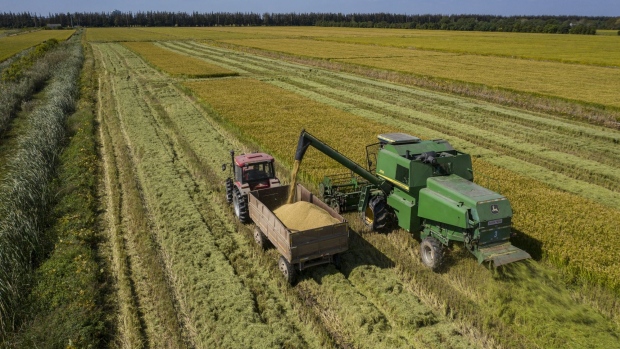China Faces Worst Crop Conditions Ever Due to Climate Change
, Bloomberg News
(Bloomberg) -- More extreme weather caused by rising global temperatures — compounded by geopolitical turmoil and the pandemic — is hindering China’s effort to ensure food supplies for its 1.4 billion population.
President Xi Jinping has made food security a priority for the world’s second-biggest economy, an effort to meet the soaring demand that’s pushed imports of corn, soybeans and wheat to record levels, making Beijing increasingly vulnerable to trade tensions and supply shocks. At the same time, climate change-induced disasters have caused widespread crop damage and shrunk the amount of arable land, making it harder to boost local production.
Tang Renjian, the country’s agriculture minister, brought up the threat at a high-profile government meeting in Beijing this month. “China faces big difficulties in food production because of the unusual floods last autumn,” he told reporters. “Many faming experts and technicians told us that crop conditions this year could be the worst in history.”
More than 860 people died or went missing in natural disasters last year, which damaged almost 30 million acres of crops. Record-breaking rains in the central province of Henan in July alone damaged 2.1 million acres of farmland. The floods delayed planting on more than 18 million acres of land, about one-third of China’s total winter wheat acreage. The amount of first- and second-grade crops, where there are more than 2.7 million seedlings on every acre of land, fell by more than 20% this year compared with normal years.
Climate change hurts China’s pursuit of food security in two ways, according to Zhang Zhaoxin, a researcher with the agricultural ministry. More frequent extreme weather events are already lowering crop yields. Meanwhile, increasingly unpredictable seasons can undermine farmers’ confidence and potentially worsen the sector’s existing labor shortage.
Farmers in northern China are used to droughts, not floods, Zhang said. In many of the regions that were affected by torrential rain last year, farmers couldn’t harvest their corn because their machinery couldn’t handle the water. There wasn’t enough infrastructure such as pipes and systems to drain the field in time.
Those issues are set to get more serious as the planet warms. Seasonal droughts will reduce yields of China’s three major staple foods — rice, wheat and corn — by 8% by the end of the decade, according to World Resources Institute. In the longer term, climate change also means rising coastal waters along the long and low eastern coal could further stress the agricultural industry.
“As climate change continues to intensify in coming years, weather events are going to have a greater and greater impact on agricultural productivity,” said Even Pay, an agricultural analyst with Trivium. Ramping up imports isn’t a viable alternative, she added, pointing out that global warming makes food cultivation more challenging globally. “Climate change felt in the rest of the world could also impact China’s food security,” she said.
©2022 Bloomberg L.P.
No comments:
Post a Comment